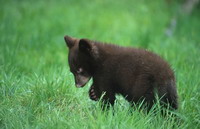New Jersey only center to care for orphaned black bear cubs houses record number of cubs
In a state known more for urban sprawl than wildlife, the only center to care for orphaned black bear cubs is housing a record number of cubs.

"It's New Jersey, and we're talking about bears!" said Tracy Leaver, 52, who operates the privately-run Woodlands Wildlife Refuge, which took in eight bears in less than a week in early June.
The three mothers of those eight cubs were all shot by officials after either breaking into or attempting to break into homes, said Darlene Yuhas, a spokeswoman for the Department of Environmental Protection.
The department allows bears to be killed if their behavior is deemed to be a threat to humans.
Meanwhile, Leaver learned this week that another bear found with a broken leg was on its way.
The Woodlands Wildlife Refuge usually takes care of one or two cubs a year, and the most they have ever had at one time is six, Leaver said.
Leaver said caring for the record number of cubs is a challenge. Operators had to buy more formula and food than expected, and they had to scramble for a place big enough to hold them all. As a result, some of the cubs were put in an empty fox cage.
The refuge had been planning in the coming years to build a new bear cage, which would include a pond and more trees and cost at least $20,000 (14,850 EUR). It now will be needed in the coming weeks.
"They'll outgrow the fox cage really fast," Leaver said. "It is a big strain on our resources. It is not in the budget."
The refuge does not get any state or federal money, and the entire $150,000 (111,383 EUR) budget comes entirely from donations, Leaver said.
When the cubs came in, they each weighed about 10-15 pounds (4.5-6.8 kilograms), and have quickly grown to 20-25 pounds (9-11 kilograms), Leaver said. By the time they are released into the wild in May, they will be a little over 100 pounds (45 kilograms).
Black bears had been all but extinct in New Jersey but have rebounded spectacularly.
In 2005 and 2003, the state held a bear hunt to thin their numbers. A third hunt slated for December 2006 was canceled by DEP Commissioner Lisa Jackson, who said the state needed to focus more attention on non-lethal measures to control the amount of bears.
The state has been doing more to educate people on how not to attract bears. This includes keeping garbage safely sealed, removing bird feeders and not feeding the bears.
Leaver said at this time of year, as yearlings are getting kicked out of the den, adult bears are looking for mates and many natural foods such as berries are not yet abundant, bears are more likely to forage in areas where it is easy to find food. And they quickly learn which neighborhoods are tasty.
Subscribe to Pravda.Ru Telegram channel, Facebook, RSS!

